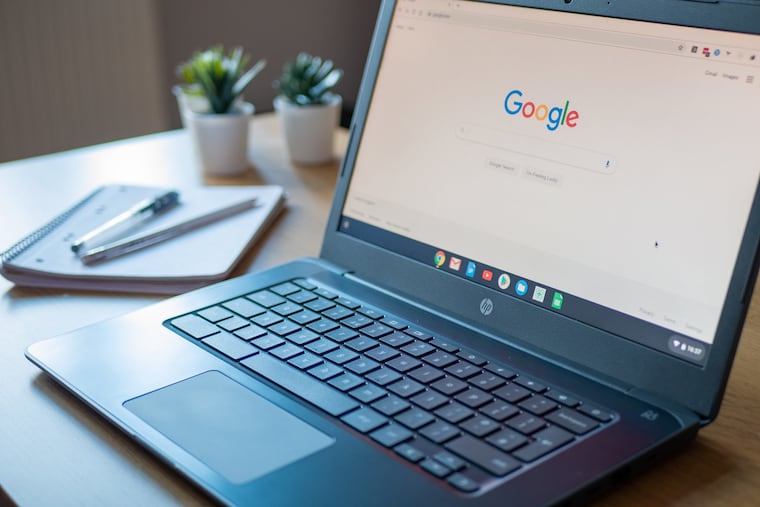Deptford schools will disable Chromebooks at night to protect students’ sleep. The conversation is being held elsewhere, too.
Citing an uptick in screen time on devices at night, Superintendent Kevin Kanauss notified parents last week about the South Jersey school system's plans.

Beginning next month, students in the Deptford Township School District may have to race to finish their homework before the clock runs out for the night on their district-issued Chromebooks.
Citing an uptick in screen time on devices at night, Superintendent Kevin Kanauss notified parents last week that the South Jersey school system would begin disabling Chromebooks during hours it believes students should be resting and recovering from the school day. The times at which they would be disabled would vary depending on grade level.
Kanauss said the district, which enrolls nearly 4,000 students in K-12, wants to discourage “unhealthy behaviors.” He said some students are on their district devices well after midnight.
“In each decision we make, we ask ourselves if we are setting up our students for success,” Kanauss wrote in a letter Thursday to parents. “We feel this initiative encourages good life habits and supports a great start to each day ... .”
The new policy immediately drew a flood of responses from parents on social media on the Deptford Talk Facebook page, saying some students are delayed from starting homework because of extracurricular commitments. In response, the district sent a letter to parents Tuesday that its administrative team was reviewing the concerns, and said adjustments may be made to the policy that takes effect March 1.
“The spirit of this initiative stems from our responsibility to create good digital citizens, which we take seriously. However, we do hear and understand parent and student concerns regarding students’ non-academic commitments and responsibilities. Ensuring students are receiving an appropriate amount of homework is also very much a part of this plan,” Kanauss wrote.
Under the plan announced last week, school Chromebooks would be disabled from 8 p.m. to 6 a.m. for elementary students; 9 p.m. to 6 a.m. for middle schoolers, and 10 p.m. to 6 a.m. for high schoolers.
All Deptford students are given a Chromebook for in-class activities. Students in fourth through 12th grades are allowed to take them home nightly to complete assignments or study for assessments.
Schools around the country began relying heavily on Chromebooks and devices to offer remote instruction during the pandemic when schools were abruptly closed. Districts were encouraged to offer a device to each child who needed one to connect to the classroom.
» READ MORE: Bridging the digital divide for the ‘have’ and ‘have nots’: How schools are meeting the need during remote learning
Deptford uses Lightspeed Systems software to help track of how and when students are using their Chromebooks at home and in school. Kanauss said the district’s technology has recently noticed an increase in student Chromebook use at night.
Kanauss and district spokesperson Salvatore Randazzo did not respond to messages Tuesday seeking comment.
Are other districts considering this?
It was not immediately known whether other districts have imposed after-hours restrictions for their devices. The New Jersey Department of Education collects data on student devices and internet connection.
But Haddonfield Superintendent Chuck Klaus said his district may consider shutting down devices at night, too. Experts recommend limiting students’ screen time for both educational purposes as well as activities such as playing video games.
“We also have growing concerns with the amount of screen time and how late many of our students are up working, but we have not ventured down this path,” Klaus said. “It is an interesting conversation.”
The Cinnaminson Township School District has discussed limiting access, but has not adopted a policy to disable devices, said Superintendent Stephen Cappello. The district relies on parent partnerships to help determine the appropriate use of technology at home, he said.
Collingswood is reviewing its Chromebook practices for the 2024-25 school year in terms of student access and overall usage at school and home, said Superintendent Fred McDowell. The district is not considering restrictions to limit access at night, he said.
“Staying up too late is a family issue,” McDowell said.
The new policy prompted concerns and questions from parents. Some said it would be difficult for older students who work or participate in extracurricular activities to complete their homework by 10 p.m.
“Possibly well-intentioned but also possibly very slippery. Are the Chromebooks the only way to an education in the district?” wrote John Cooper.
The Lightspeed portal allows parents and the district to remotely track students’ screen time as well as review websites that students visit. Parents can also set a time to disable the devices. Students can also use their personal devices, laptops and cell phones to access school programs.
» READ MORE: Poised to spend $5 million to lock up students’ cell phones, Philly schools pause on the purchase
“This is a massive mistake,” Hannah Mann wrote in a Facebook post. “There are all sorts of reasons a child would be up late doing homework. What an incredibly classist decision this was. Most families no longer have a ’family computer.’”
Brielle Wolf wrote: “I love this idea. If children aren’t getting home until almost the computer-cutoff time due to other activities, then the teachers should be assigning less or NO homework.”
Said Michelle Whelan: “How about let the parents decide on when their kids shouldn’t be on the computer?”
Kanauss said the restrictions would promote better time management for students. It may also help identify students who are overworked with school assignments.
“Our goal is to ensure all our students’ academic workload is such that they are able to complete their assignments without sacrificing sleep or experiencing undue stress,” he said.